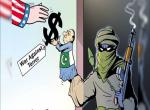THE ENEMIES, both within and without, use bullets and bombs, not to kill people. They are collateral damages. The real objective is to subdue the enemy by breaking its will and dictating its terms of peace.
So far as emigrants go, according to the governor of Assam, 6,000 enter the state everyday. ULFA did start in 1979 as a violent movement to drive away foreigners who threatened their lands, jobs, culture, language and political voice.
But that ULFA has died. In its new incarnation it is a handmaid of those who it had vowed to fight to the finish.
After 1992, it has been inextricably caught in the web spun by Pakistani and Bangladeshi intelligence, becoming a
tactical tool of short-term use in their long-term strategic plan. There is a continuity in Pakistani and Bangladeshi discourse on Assam.
Jinnah pronounced in Gauhati in 1946 that 'Assam was in his pocket'. In Eastern Pakistan: Its Population and Economics, Mujibur Rahman observed: 'Because Eastern Pakistan must have sufficient land for its expansion and because Assam has abundant forests and mineral resources, coal, petroleum, etc East Pakistan must include Assam to be financially and economically strong'.
Eminent Bangladeshi thinkers are busy making out a case of Lebensraum, emphasising the north-east as a natural space for expansion.
Sadiq Khan, a former diplomat and an intellectual, said in an article: 'A natural overflow of population pressure is very much on the cards and will not be restrainable by barbed wire or border patrol measures'.
The meetings of Islamic parties in Bangladesh and closed door groups of their counterparts in Assam are regularly talking of Greater Bangladesh.
The active support to illegal migrants by BDR and other Bangladeshi authorities is too blatant to need emphasis.
India's capability to clear 20 million illegal immigrants from the country is low and will keep dipping as the number grows and their political support increases.
In the north-east nearly a dozen Muslim extremist organisations, with estimated strength of 3,500, have mushroomed, most of them in Assam.
They are not indulging in violence but carrying out recruitment, sending youth for training to Bangladesh and Pakistan, dumping weapons and explosives and creating support structures along the border.
Based on interrogations of arrested Muslim militants, a former chief minister tabled a report in the Assam assembly, revealing that large numbers of Muslim youth from Assam were being trained by ISI and DGFI (Bangladesh intelligence) to destabilise Assam and facilitate illegal immigration.
Demographic changes caused by illegal emigration have assumed dangerous proportions. The districts of Dhubri (70.46 per cent), Barpeta (56.07 per cent), Hilakandi (54.79 per cent) and Goalpara (50.18 per cent) had become Muslim majority districts with Nagaon, Morigaon and Karimganj, among others, joining the league.
Surpassing even Pakistanis and Bangladeshis, the ULFA website accuses Congress of merging Assam with India by defrauding the Muslim League.
ULFA chairman Rajkhowa condemning India during the Kargil war is indicative of the organisation's Pakistani subservience.
An ULFA pamphlet captioned East Bengali Migrants claims 'East Bengali migrants are Assamese. Without their help ULFA cannot be successful.
They are our real well-wishers, our friends, better than the Indians earning at the cost of the Assamese people'.
This indicates how ULFA has diluted its ideological position and is going to facilitate demographic invasion by destabilising the area and diverting the attention of security agencies from the important to the immediate.
Driving out non-Assamese is a necessary prelude before Assamese are hit by Islamic zealots to repeat Kashmir, probably with better preparedness and planning this time.
The political consolidation of Muslims on communal lines has started with the formation of Assam United Democratic Front.
Though formed just a few months before the assembly election, it bagged third largest number of votes capturing 10 seats.
In their private confabulations, the party envisions itself as the political rallying point for Bangladeshi Muslims. Security implications of emergence of political Islam in a region with 38 per cent Muslim population, with portents of becoming a Muslim majority state in future, presence of nearly a dozen jehadi groups and over 1,500 km long border with a potentially radicalised Bangladesh should not become a casualty of political expediency.
The author is a former chief of the Intelligence Bureau
Published in The Times Of India on January 25, 2007









Post new comment